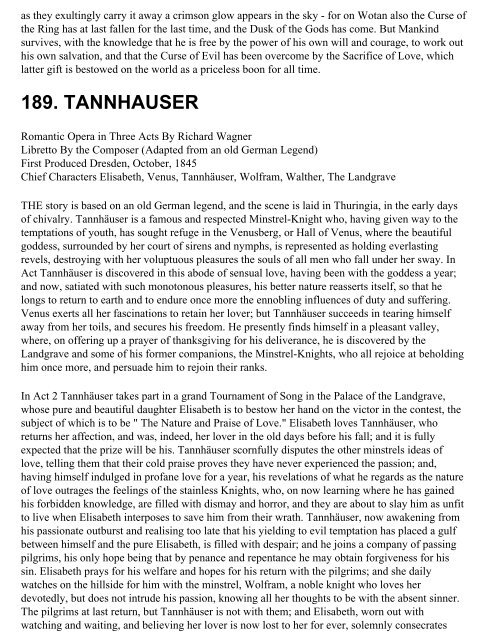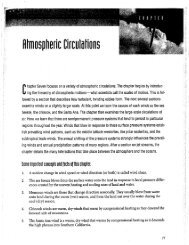Opera Plots I - MDC Faculty Home Pages
Opera Plots I - MDC Faculty Home Pages
Opera Plots I - MDC Faculty Home Pages
You also want an ePaper? Increase the reach of your titles
YUMPU automatically turns print PDFs into web optimized ePapers that Google loves.
as they exultingly carry it away a crimson glow appears in the sky - for on Wotan also the Curse of<br />
the Ring has at last fallen for the last time, and the Dusk of the Gods has come. But Mankind<br />
survives, with the knowledge that he is free by the power of his own will and courage, to work out<br />
his own salvation, and that the Curse of Evil has been overcome by the Sacrifice of Love, which<br />
latter gift is bestowed on the world as a priceless boon for all time.<br />
189. TANNHAUSER<br />
Romantic <strong>Opera</strong> in Three Acts By Richard Wagner<br />
Libretto By the Composer (Adapted from an old German Legend)<br />
First Produced Dresden, October, 1845<br />
Chief Characters Elisabeth, Venus, Tannhäuser, Wolfram, Walther, The Landgrave<br />
THE story is based on an old German legend, and the scene is laid in Thuringia, in the early days<br />
of chivalry. Tannhäuser is a famous and respected Minstrel-Knight who, having given way to the<br />
temptations of youth, has sought refuge in the Venusberg, or Hall of Venus, where the beautiful<br />
goddess, surrounded by her court of sirens and nymphs, is represented as holding everlasting<br />
revels, destroying with her voluptuous pleasures the souls of all men who fall under her sway. In<br />
Act Tannhäuser is discovered in this abode of sensual love, having been with the goddess a year;<br />
and now, satiated with such monotonous pleasures, his better nature reasserts itself, so that he<br />
longs to return to earth and to endure once more the ennobling influences of duty and suffering.<br />
Venus exerts all her fascinations to retain her lover; but Tannhäuser succeeds in tearing himself<br />
away from her toils, and secures his freedom. He presently finds himself in a pleasant valley,<br />
where, on offering up a prayer of thanksgiving for his deliverance, he is discovered by the<br />
Landgrave and some of his former companions, the Minstrel-Knights, who all rejoice at beholding<br />
him once more, and persuade him to rejoin their ranks.<br />
In Act 2 Tannhäuser takes part in a grand Tournament of Song in the Palace of the Landgrave,<br />
whose pure and beautiful daughter Elisabeth is to bestow her hand on the victor in the contest, the<br />
subject of which is to be " The Nature and Praise of Love." Elisabeth loves Tannhäuser, who<br />
returns her affection, and was, indeed, her lover in the old days before his fall; and it is fully<br />
expected that the prize will be his. Tannhäuser scornfully disputes the other minstrels ideas of<br />
love, telling them that their cold praise proves they have never experienced the passion; and,<br />
having himself indulged in profane love for a year, his revelations of what he regards as the nature<br />
of love outrages the feelings of the stainless Knights, who, on now learning where he has gained<br />
his forbidden knowledge, are filled with dismay and horror, and they are about to slay him as unfit<br />
to live when Elisabeth interposes to save him from their wrath. Tannhäuser, now awakening from<br />
his passionate outburst and realising too late that his yielding to evil temptation has placed a gulf<br />
between himself and the pure Elisabeth, is filled with despair; and he joins a company of passing<br />
pilgrims, his only hope being that by penance and repentance he may obtain forgiveness for his<br />
sin. Elisabeth prays for his welfare and hopes for his return with the pilgrims; and she daily<br />
watches on the hillside for him with the minstrel, Wolfram, a noble knight who loves her<br />
devotedly, but does not intrude his passion, knowing all her thoughts to be with the absent sinner.<br />
The pilgrims at last return, but Tannhäuser is not with them; and Elisabeth, worn out with<br />
watching and waiting, and believing her lover is now lost to her for ever, solemnly consecrates













